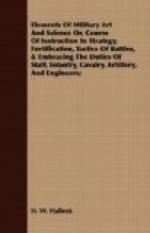All modern ethical writers regard unjust war as not only immoral, but as one of the greatest of crimes—murder on a large scale. Such are all wars of mere ambition, engaged in for the purpose of extending regal power or national sovereignty; wars of plunder, carried on from mercenary motives; wars of propagandism, undertaken for the unrighteous end of compelling men to adopt certain religious or political opinions, whether from the alleged motives of “introducing a more orthodox religion,” or of “extending the area of freedom.” Such wars are held in just abhorrence by all moral and religious people: and this is believed to be the settled conviction of the great mass of our own citizens.
But in addition to that respectable denomination of Christians who deny our right to use arms under any circumstances, there are many religious enthusiasts in other communions who, from causes already noticed, have adopted the same theory, and hold all wars, even those in self-defence, as unlawful and immoral. This opinion has been, within the last few years, pressed on the public with great zeal and eloquence, and many able pens have been enlisted in its cause. One of the most popular, and by some regarded one of the most able writers on moral science, has adopted this view as the only one consonant with the principles of Christian morality.
It has been deemed proper, in commencing a course of lectures on war, to make a few introductory remarks respecting this question of its justifiableness. We know of no better way of doing this than to give on the one side the objections to war as laid down in Dr. Wayland’s Moral Philosophy, and on the other side the arguments by which other ethical writers have justified a resort to war. We do not select Dr. Wayland’s work for the purpose of criticizing so distinguished an author; but because he is almost the only writer on ethics who advocates these views, and because the main arguments against war are here given in brief space, and in more moderate and temperate language than that used by most of his followers. I shall give his arguments in his own language.
“I. All wars are contrary to the revealed will of God.”
It is said in reply, that if the Christian religion condemns all wars, no matter how just the cause, or how necessary for self-defence, we must expect to find in the Bible some direct prohibition of war, or at least a prohibition fairly implied in other direct commandments. But the Bible nowhere prohibits war: in the Old Testament we find war and even conquest positively commanded, and although war was raging in the world in the time of Christ and his apostles, still they said not a word of its unlawfulness and immorality. Moreover, the fathers of the church amply acknowledge the right of war, and directly assert, that when war is justly declared, the Christian may engage in it either by stratagem or open force. If it be of that highly wicked and immoral character which some have recently attributed to it, most assuredly it would be condemned in the Bible in terms the most positive and unequivocal.




